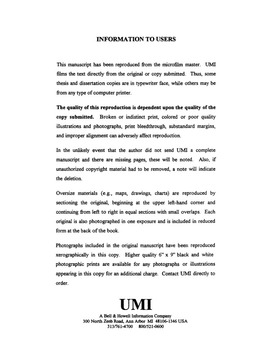| dc.contributor.advisor | Kramer, Eric Mark, | en_US |
| dc.contributor.author | Pathak, Archana A. | en_US |
| dc.date.accessioned | 2013-08-16T12:30:07Z | |
| dc.date.available | 2013-08-16T12:30:07Z | |
| dc.date.issued | 1998 | en_US |
| dc.identifier.uri | https://hdl.handle.net/11244/5669 | |
| dc.description.abstract | This idea of cultural fusion is best examined utilizing Jean Gebser's theory of civilizational expression. In his text, The Ever-Present Origin (1949/1985), Gebser explains the structures of consciousness as ways of being and structuring perception. Utilizing Gebser's work, this dissertation presents a historical hermeneutics of Indian-American identity, examining issues such as the concept of model minority, frozen-in-time memory, religion as a system of cultural preservation and the westernization of the world. | en_US |
| dc.description.abstract | Informed by a postcolonial perspective, this dissertation examines the notion of hyphenated identities and how identity is both preformed and communicated. Through observations, ethnographic interviews, and survey responses, it is clear that Indian-Americans do engage in cultural fusion, creating a culture in which both original cultures are continuously present and visible. Additionally, as culture is dynamic and continuously changing, the notion of "Indianness" and "Americanness" is continually being re-defined by and within the Indian-American community. | en_US |
| dc.description.abstract | Focusing on the post-1965 immigrant experiences of Asian Indian-Americans, this dissertation serves to examine the notion of identity, diaspora and home. A multi-method study utilizing hermeneutics, ethnography, survey method and phenomenology, this work presents a theory of cultural fusion. Furthermore, this work serves to critique adaptation theory as it is presented in the intercultural communication literature. | en_US |
| dc.description.abstract | In this postmodern world, the notion of "identity" is defined as in crisis. This is because the way in which one defines identity is no longer limited by space or time. This crisis is most visible when one considers the growing use of the hyphen in the process of labeling self. Furthermore, though immigration into the United States continues, the type of immigrant coming into this country is continually changing. This change is redefining the notion of "Americanness" at the same time that it is changing the sense of one's original culture. | en_US |
| dc.format.extent | xiii, 225 leaves ; | en_US |
| dc.subject | Speech Communication. | en_US |
| dc.subject | Sociology, Ethnic and Racial Studies. | en_US |
| dc.subject | Immigrants United States Identification. | en_US |
| dc.subject | East Indian Americans Cultural assimulation. | en_US |
| dc.subject | Anthropology, Cultural. | en_US |
| dc.title | To be Indian (hyphen) American: Communicating diaspora, identity and home. | en_US |
| dc.type | Thesis | en_US |
| dc.thesis.degree | Ph.D. | en_US |
| dc.thesis.degreeDiscipline | Department of Communication | en_US |
| dc.note | Adviser: Eric Mark Kramer. | en_US |
| dc.note | Source: Dissertation Abstracts International, Volume: 59-07, Section: A, page: 2252. | en_US |
| ou.identifier | (UMI)AAI9839803 | en_US |
| ou.group | College of Arts and Sciences::Department of Communication | |
